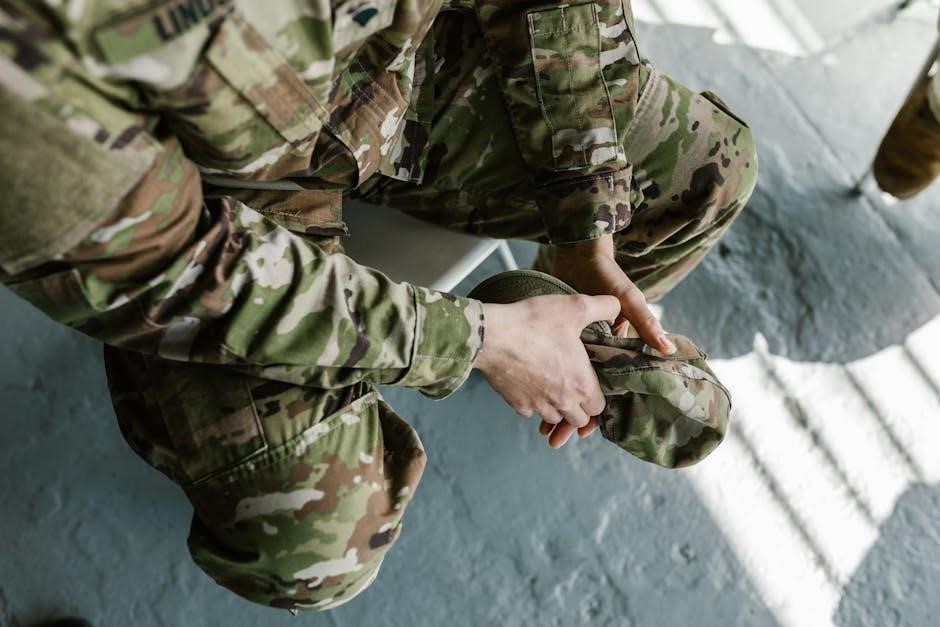
The Army NCO Guide (FM 7-22․7) is a comprehensive resource for noncommissioned officers, detailing their duties, responsibilities, and authority․ It serves as a critical tool for NCOs across all Army components, providing essential guidance for leadership and professional development;
Key Updates in the Latest Version
The latest version of the Army NCO Guide (FM 7-22․7) includes significant updates such as section rearrangement, a larger layout, and updated philosophies․ It incorporates new manual references and expanded support resources, including websites․ The guide now features a Change of Responsibility Script and an NCO Induction Ceremony Guide․ These updates aim to enhance leadership effectiveness and provide NCOs with modern tools to excel in their roles․ The revised guide reflects the Army’s commitment to developing agile, resilient, and adaptable leaders․
Importance of the Guide for NCO Success
The Army NCO Guide (FM 7-22․7) is indispensable for NCO success, as it provides clear guidance on leadership, responsibilities, and professional development․ It equips NCOs with the knowledge to excel in their roles, ensuring they can lead, supervise, and care for soldiers effectively․ The guide emphasizes standards, discipline, and adaptability, which are critical for building a cohesive and effective fighting force․ By adhering to its principles, NCOs can foster resilience, agility, and continuous growth, ultimately contributing to the Army’s mission and the success of their teams․
Leadership and Responsibilities of NCOs
NCOs are pivotal in leading soldiers, embodying the Army’s values, and executing missions․ Their responsibilities encompass supervision, mentorship, and maintaining high standards of discipline and professionalism․
Role in Leading, Supervising, and Caring for Soldiers
NCOs are the backbone of the Army, responsible for leading, supervising, and caring for soldiers․ They mentor and guide soldiers to achieve mission success, fostering a cohesive and disciplined team․ NCOs ensure soldiers are trained, motivated, and prepared for duty, while also addressing their well-being and personal development․ Their leadership style balances authority with empathy, creating trust and resilience within units․ By prioritizing soldier care, NCOs build strong relationships, ensuring soldiers are ready to perform at their best in any situation, both on and off the battlefield․

Professional Development Resources

The Army NCO Guide highlights essential resources like the NCO Professional Development Guide and the NCO Writing Excellence Program, fostering continuous growth and skill enhancement for NCOs․
NCO Professional Development Guide
The NCO Professional Development Guide provides structured pathways for NCOs to enhance their leadership and technical skills․ It outlines training, education, and experiential learning opportunities, ensuring NCOs are prepared for increasing levels of responsibility․ The guide emphasizes mentorship, self-development, and continuous improvement, aligning with the Army’s leadership philosophy․ It serves as a roadmap for NCOs at every career stage, from junior to senior leadership roles․ By following this guide, NCOs can achieve professional excellence and contribute effectively to their units and the Army’s mission․
NCO Writing Excellence Program

The NCO Writing Excellence Program is a quarterly competition designed to enhance writing skills and foster critical thinking among noncommissioned officers․ It encourages NCOs to share insights on key issues impacting leadership, training, and Army operations․ By participating, NCOs can develop their ability to communicate effectively and contribute to professional discussions․ This initiative supports the Army’s commitment to fostering a culture of continuous learning and intellectual growth within the NCO Corps, ensuring leaders are well-equipped to address modern challenges․
The NCO Creed
The NCO Creed is a foundational statement that defines the values and responsibilities of noncommissioned officers․ It emphasizes accountability, discipline, and competence, serving as a guiding principle for NCOs․
History and Significance of the NCO Creed
The NCO Creed was developed in the 1970s to provide noncommissioned officers with a set of principles to guide their actions and decisions․ It serves as a foundation for NCO professionalism, emphasizing accountability, discipline, and leadership․ The Creed is presented to inductees during the NCO Induction Ceremony, symbolizing their commitment to the Corps․ Its significance lies in its ability to inspire NCOs to uphold the highest standards of integrity and service, ensuring the Army maintains a cohesive and effective force․ The Creed remains a cornerstone of NCO development and identity․

Tools and Resources for NCOs
The Army Leadership Manual and Digital Tools for NCOs provide essential resources for professional growth, while the NCO Professional Development Guide offers structured pathways for career advancement․
Army Leadership Manual
The Army Leadership Manual is a foundational resource that outlines principles and practices for effective leadership․ It emphasizes the importance of self-awareness, self-discovery, and subordinate development․ This manual complements the NCO Guide by providing practical tools for leading, supervising, and caring for soldiers․ It serves as a comprehensive guide for NCOs to enhance their leadership skills, ensuring they can meet the challenges of modern warfare and maintain a cohesive, effective fighting force․ The manual is essential for all NCOs seeking to excel in their roles and responsibilities within the Army;
Digital Tools for NCOs
Digital tools play a pivotal role in enhancing NCO effectiveness․ The Army NCO Guide highlights resources like the NCO Writing Excellence Program and online platforms for professional development․ Tools such as the Army Leadership Manual app and digital task management systems streamline responsibilities․ These resources enable NCOs to access critical information, manage tasks, and improve communication․ Digital tools also facilitate continuous learning and adaptability, ensuring NCOs remain proficient in leading modern operations․ By leveraging technology, NCOs can efficiently fulfill their duties and contribute to mission success․

NCO Induction Ceremony Guide
The NCO Induction Ceremony honors the transition of soldiers to noncommissioned officer status․ It includes a formal script and procedures, symbolizing their new leadership role and responsibilities․
Ceremony Script and Procedures
The NCO Induction Ceremony is a formal event marking a soldier’s transition to noncommissioned officer status․ The ceremony includes a structured script outlining the sequence of events, such as opening remarks, the induction oath, and the presentation of the NCO Creed․ A copy of the creed is traditionally presented to each inductee, symbolizing their commitment to leadership․ The procedures ensure uniformity and professionalism, reflecting the gravity of the occasion․ The Change of Responsibility Script and detailed guidelines are provided in the NCO Induction Ceremony Guide, ensuring a seamless execution of this significant milestone․

Current Issues in NCO Development
The Army addresses challenges such as adapting to new evaluation systems and ensuring NCOs meet education requirements for promotions, focusing on enhancing leadership and professional growth․
Recent Changes and Initiatives
Recent updates to the Army NCO Guide (FM 7-22․7) include a restructured layout, updated philosophies, and additional resources like websites and ceremony guides․ The Army has also introduced the NCO Writing Excellence Program to enhance writing skills and foster discussions on key issues․ Changes in promotion policies, such as suspending temporary promotions for NCOs with incomplete education requirements, aim to ensure leaders meet higher standards․ These initiatives reflect the Army’s commitment to developing resilient, agile, and adaptable NCOs, aligning with the NCO Creed and modern leadership expectations․
The Role of NCOs in Modern Warfare
NCOs are the backbone of the Army, ensuring discipline, standards, and mission accomplishment․ In modern warfare, they lead, train, and care for soldiers, adapting to complex and evolving challenges․ NCOs make critical decisions, mentor subordinates, and maintain unit cohesion․ Their expertise and ability to operate in dynamic environments are vital․ The Army NCO Guide emphasizes their role in fostering resilience, agility, and adaptability, ensuring NCOs remain central to the Army’s success in contemporary conflicts․
The Army NCO Guide serves as a cornerstone for NCO leadership development, equipping leaders with the tools and knowledge needed to excel in modern warfare․ By fostering resilience, adaptability, and a strong understanding of duties, the guide ensures NCOs remain indispensable to the Army’s mission․ Its emphasis on continuous learning and strategic alignment with the Army’s future underscores the critical role NCOs play in maintaining a cohesive and effective force․ This guide is not just a manual—it’s a commitment to the NCO Corps’ enduring success and relevance in an ever-evolving military landscape․